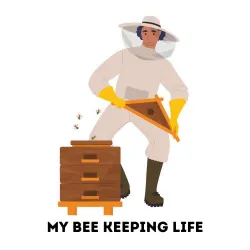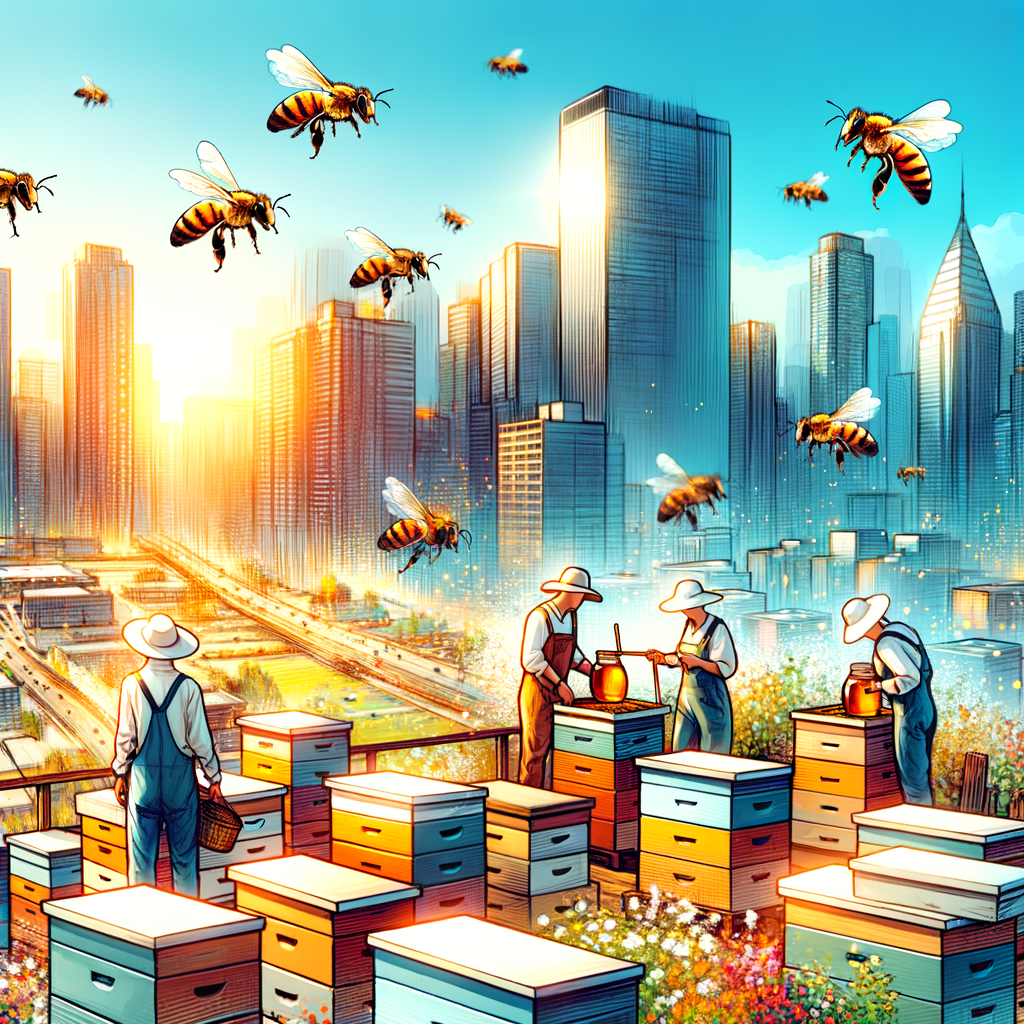
Introduction to Beekeeping
Welcome to the fascinating world of beekeeping! This practice, which involves the maintenance of bee colonies in hives, is not only a rewarding hobby but also a crucial part of our ecosystem. In this section, we will delve into the basics of beekeeping and explore the importance of honey bees in our environment.
-
- Understanding the basics of beekeeping
Beekeeping, also known as apiculture, is the art of maintaining bee colonies, usually in hives. This practice has been around for thousands of years, with early humans harvesting honey from wild bees. Today, beekeeping has evolved into a science, with beekeepers understanding the intricate behaviors and needs of their bees.
As a beekeeper, your primary responsibilities include managing the colonies, ensuring the bees’ health, and harvesting honey. You will need to learn about the different types of bees in a colony, the roles they play, and how to handle common bee diseases and pests. It’s also essential to understand the bees’ lifecycle and how to manage their population throughout the year.
-
- The importance of honey bees in our ecosystem
Honey bees play a vital role in our ecosystem. They are some of the world’s leading pollinators, meaning they help plants reproduce. When a bee collects nectar from a flower, pollen grains stick to its body. As the bee moves from flower to flower, some of this pollen rubs off, fertilizing the plants and enabling them to produce fruit and seeds.
Without honey bees, our food system would look drastically different. In fact, it’s estimated that one-third of the food we eat relies on pollination, primarily by bees. This includes fruits, vegetables, nuts, and even the plants that livestock eat. So, by keeping bees, you’re not only producing delicious honey but also contributing to a healthy and diverse ecosystem.
Beekeeping Research Programs
Research is an essential part of any field, and beekeeping is no exception. Let’s explore the importance of research in apiculture and the key areas of focus.
Overview of Beekeeping Research
Beekeeping research, also known as apiculture research, is a specialized field of study that focuses on understanding and improving the practices related to the maintenance of bee colonies. This research is crucial for several reasons.
-
- Understanding the need for research in apiculture
Research in apiculture is vital for the survival and prosperity of honey bees. Honey bees play a crucial role in our ecosystem, particularly in pollination, which is essential for the growth of many of our food crops. However, various challenges, such as diseases, pests, and climate change, threaten their existence. Apiculture research aims to find solutions to these problems, ensuring the survival of bees and, in turn, our food supply.
-
- Key areas of focus in beekeeping research
There are several key areas that beekeeping research focuses on. These include:
-
- Bee Health: This involves studying diseases and pests that affect bees and finding ways to prevent and treat them.
- Honey Production: Research in this area aims to improve honey yield and quality.
- Pollination: Researchers study how bees pollinate different crops and how this process can be optimized.
- Impact of Environmental Factors: This involves studying how factors like climate change and pesticides affect bees and finding ways to mitigate these impacts.
Through continued research in these areas, we can ensure the survival and prosperity of bees, which are vital to our ecosystem and food supply.
Notable Beekeeping Research Programs
There are numerous research programs around the world dedicated to the study of bees and beekeeping. Two of the most notable programs are the apiculture research at XYZ University and the honey bee conservation research at ABC Institute.
- Apiculture Research at XYZ University
XYZ University is renowned for its comprehensive apiculture research program. The program aims to provide a deeper understanding of bee behavior, biology, and the challenges they face. It also focuses on developing innovative solutions to enhance bee health and productivity. The research team at XYZ University is dedicated to advancing knowledge in beekeeping and making significant contributions to the field.
| Key Research Areas | Impact |
|---|---|
| Bee Behavior and Biology | Enhanced understanding of bee communication and navigation |
| Bee Health | Development of treatments for common bee diseases |
| Productivity Enhancement | Improved honey yield and quality |
- Honey Bee Conservation Research at ABC Institute
ABC Institute is another leading institution in beekeeping research, with a particular focus on honey bee conservation. The institute’s research program aims to conserve and protect honey bee populations by addressing the threats they face, such as habitat loss, disease, and climate change. The researchers at ABC Institute are committed to ensuring the survival and prosperity of honey bees, which are vital for pollination and biodiversity.
| Key Research Areas | Impact |
|---|---|
| Habitat Conservation | Preservation and restoration of bee habitats |
| Disease Control | Development of effective disease prevention strategies |
| Climate Change Impact | Understanding and mitigating the effects of climate change on bees |
Both XYZ University and ABC Institute are making significant strides in beekeeping research. Their work is not only crucial for the future of beekeeping but also for the health of our ecosystems.
Internships in Beekeeping
Internships are a valuable way to gain hands-on experience in any field, and beekeeping is no exception. An internship in beekeeping can provide you with practical skills and a deeper understanding of the industry. Let’s explore some of the benefits of beekeeping internships.
Benefits of Beekeeping Internships
There are numerous benefits to undertaking an internship in the field of beekeeping. Here are a couple of the most significant ones:
-
- Gaining practical experience in the field: Beekeeping is a hands-on job that requires a lot of practical skills. An internship allows you to gain this experience under the guidance of seasoned professionals. You’ll learn how to handle bees, operate beekeeping equipment, and manage a hive. This experience is invaluable and can give you a significant edge when you’re ready to start your own beekeeping venture.
- Understanding the beekeeping industry better: An internship can also provide you with a deeper understanding of the beekeeping industry. You’ll learn about the challenges and opportunities in the field, the latest trends, and the best practices. This knowledge can help you make informed decisions about your career in beekeeping.
In conclusion, a beekeeping internship is a great way to gain practical experience and a deeper understanding of the industry. It can set you on the right path towards a successful career in beekeeping.
Top Bee Farm Internships
For those interested in pursuing a career in beekeeping, internships provide an invaluable opportunity to gain hands-on experience and learn from industry professionals. Here, we will highlight two top bee farm internships that are renowned for their comprehensive training programs.
-
Internship Program at DEF Bee Farm
The DEF Bee Farm Internship Program is one of the most sought-after opportunities for budding beekeepers. This program provides a unique blend of theoretical knowledge and practical training, offering interns a chance to work closely with experienced beekeepers. Interns learn about various aspects of beekeeping, such as hive management, honey extraction, and bee health monitoring.
Location Duration Stipend DEF Bee Farm, USA 6 months Unpaid -
Professional Beekeeping Training at GHI Apiary
The Professional Beekeeping Training at GHI Apiary is another excellent opportunity for those looking to delve deeper into the world of beekeeping. This program focuses on advanced beekeeping techniques and sustainable practices. Interns get to participate in various activities, including queen rearing, honey harvesting, and disease management.
Location Duration Stipend GHI Apiary, Canada 1 year Paid
Both these internships offer a rich learning experience and a chance to understand the intricacies of beekeeping. They provide a solid foundation for anyone looking to make a career in this field.
Honey Bee Research Projects
There are numerous research projects dedicated to studying honey bees. These studies aim to understand the behavior, health, and survival of these essential pollinators. Let’s delve into some of the most significant research projects that have been conducted in recent years.
Significant Honey Bee Researches
Several studies have been conducted to understand the various factors affecting honey bees. Two of the most significant researches are:
-
- Study on the impact of climate change on honey bees
This study focused on how climate change affects honey bees. Researchers found that warmer temperatures and unpredictable weather patterns can disrupt the bees’ natural behavior. For instance, bees may start foraging earlier in the year, which could lead to a mismatch between the availability of flowers and the bees’ need for nectar. This can have a significant impact on the bees’ survival and the pollination of plants.
-
- Research on the effect of pesticides on bee colonies
This research aimed to understand the impact of pesticides on honey bee colonies. The study revealed that certain pesticides can harm bees, affecting their ability to reproduce and survive. For example, some pesticides can reduce the queen’s fertility, leading to a decline in the colony’s population. This research has led to calls for more responsible use of pesticides to protect our precious pollinators.
These research projects highlight the importance of protecting honey bees. They play a crucial role in our ecosystem, and their decline could have serious consequences for our environment and food supply. Therefore, it’s essential to continue studying and implementing strategies to safeguard their survival.
Case Studies
In this section, we will dive into some real-life examples of successful beekeeping. We will explore two case studies: JKL Apiary and MNO Bee Farm. Both have achieved great success in their respective fields, and we can learn a lot from their experiences.
Success Stories in Beekeeping
Success in beekeeping is not just about producing honey. It’s also about maintaining healthy bee colonies and contributing to the environment. Let’s look at two bee farms that have done an exceptional job in these areas.
-
Case study of JKL Apiary’s successful beekeeping practices
JKL Apiary, a small family-run bee farm, has been in the beekeeping industry for over 30 years. They have been successful in maintaining healthy bee colonies, which is the backbone of successful beekeeping.
One of their key practices is the regular monitoring of their bees. They check each hive weekly to ensure that the queen is healthy and laying eggs. They also look for signs of disease or pests. This proactive approach has helped them maintain healthy colonies.
JKL Apiary also believes in the importance of education. They regularly host workshops and seminars to share their knowledge with other beekeepers. Their commitment to education and community involvement is truly inspiring.
-
Case study of MNO Bee Farm’s innovative honey production techniques
MNO Bee Farm is known for its innovative approach to honey production. They have developed a unique method that allows them to produce honey all year round, even in the colder months.
Their technique involves using a special type of hive that keeps the bees warm during winter. This allows the bees to continue producing honey, even when the temperatures drop. As a result, MNO Bee Farm has been able to increase their honey production significantly.
But MNO Bee Farm’s innovation doesn’t stop there. They are also committed to sustainable beekeeping practices. They use organic methods to control pests and diseases, and they plant a variety of flowers to provide a diverse diet for their bees. Their innovative and sustainable practices have made them a leader in the beekeeping industry.
These case studies show that success in beekeeping requires dedication, innovation, and a commitment to sustainable practices. Whether you’re a seasoned beekeeper or just starting out, there’s always something to learn from the success of others.
Conclusion
As we wrap up our exploration into the world of beekeeping and apiculture research, it’s important to reflect on the key takeaways and look ahead to the future of this fascinating field.
-
- Key takeaways about beekeeping research and internships
Beekeeping research is a vital component of the agricultural industry, contributing to our understanding of bee behavior, health, and the production of honey. Internships in beekeeping offer hands-on experience, providing a unique opportunity to learn about bee biology, hive management, and honey production. These internships are not only educational, but they also contribute to the sustainability of our environment.
-
- The future of beekeeping and apiculture research
Looking ahead, the future of beekeeping and apiculture research is promising. With the increasing interest in sustainable farming and the growing awareness of the role bees play in our ecosystem, more resources are being dedicated to this field. Technological advancements are also playing a part, with new tools and techniques being developed to improve hive health and honey production. As we continue to learn more about these remarkable creatures, we can look forward to a future where bees thrive, and our environment benefits.
Whether you’re a budding beekeeper, a seasoned professional, or simply a honey enthusiast, there’s no denying the importance of beekeeping research and the role it plays in our world. By supporting this field, we’re not only promoting a sustainable future, but we’re also contributing to a healthier planet.








